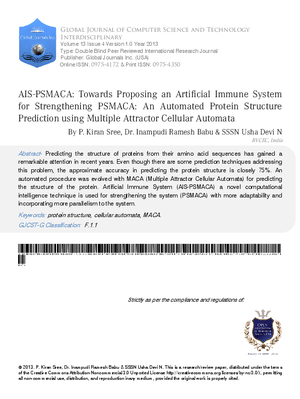Abstract
Predicting the structure of proteins from their amino acid sequences has gained a remarkable attention in recent years Even though there are some prediction techniques addressing this problem the approximate accuracy in predicting the protein structure is closely 75 An automated procedure was evolved with MACA Multiple Attractor Cellular Automata for predicting the structure of the protein Artificial Immune System AIS-PSMACA a novel computational intelligence technique is used for strengthening the system PSMACA with more adaptability and incorporating more parallelism to the system Most of the existing approaches are sequential which will classify the input into four major classes and these are designed for similar sequences AIS-PSMACA is designed to identify ten classes from the sequences that share twilight zone similarity and identity with the training sequences with mixed and hybrid variations This method also predicts three states helix strand and coil for the secondary structure Our comprehensive design considers 10 feature selection methods and 4 classifiers to develop MACA Multiple Attractor Cellular Automata based classifiers that are build for each of the ten classes We have tested the proposed classifier with twilight-zone and 1-high-similarity benchmark datasets with over three dozens of modern competing predictors shows that AIS-PSMACA provides the best overall accuracy that ranges between 80 and 89 8 depending on the dataset
This work is licensed under a Creative Commons Attribution 4.0 International License.
Copyright (c) 2013 Authors and Global Journals Private Limited

